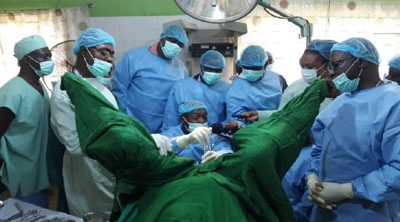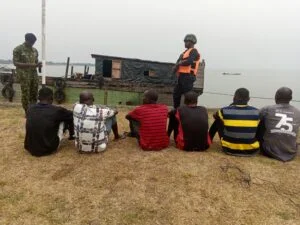Health
LUTH Inuagurates Free Telemedicne Centre for Fungal Disease

Speaking during the inuguration, the Provost of the college, Prof Adewale Oke, said that the centre would enable patients from all over the world to have access to the medical facility.
According to the provost, the centre would also serve as teaching hub for students and management of other diseases.
“Telemdicine is meant to ease communication between physician and the patient and particularly useful where there is little or no doctors.
“With telemedicine, I can communicate with anybody around the world and share not only information but with the patient video and pictures.
“The patient’s real area of default can be shared with other experts to get the normal diagnosis of the patient.
“This centre will not only manage disease but also serve as teaching hub for students in the university,” the provost said.
Dr Rita Oladele, Coordinator of the centre and Acting Head of Department, Medical Microbiology and Parasitology, said that most physicians do not bring their expertise in treatment of invasive fungal infection.
Oladele, who also President, Medical Microbiology Society of Nigeria, said over the years, the society had been trying to raise awareness among health workers on the risk of invasive fungal disease and how it could be prevented.
“Invasive fungal infection is something most doctors don’t think about and due to that, patients die unnecessarily from something that is preventable.
“I keep getting phone calls and most times I have to manage patients through other doctors on phone which is not very safe.
“So we decided to deploy telemedicine to visulise and see the patient we are trying to manage,” Dr Oladele said.
The acting HOD said that the free centre was set up to give back to the public as well as to partner media organisations to create awareness on disease infections and prevention.
Dr Osahon Omorodion, Managing Director, Pfizer, commended the initiator of the centre and promised to maintain the partnership in ensuring telemedicine thrived in Nigeria.
Omorodion added that Pfizer would continue to support the initiative and provide equipment for the treatment of invasive fungal disease patient in the country.(NAN)www.nannews.ng
Health
Millions of Children Experience Daily Domestic Violence in Schools, Homes Globally – WHO
Hundreds of millions of children and adolescents around the world face daily violence in their homes, schools, and elsewhere which could have lifelong consequences.The World Health Organisation (WHO) said this on Thursday.The violence includes being hit by family members, being bullied at school, as well as physical, emotional, and sexual violence, WHO said.
In most cases, violence occurs behind closed doors. More than half of those aged two to 17 or more than a billion minors in total experience violence each year according to the WHO. In three out of five children and adolescents, it is physical violence at home, with one in five girls and one in seven boys experiencing sexual violence.Between a quarter and half of minors are affected by bullying according to the information provided.Only half of the children reportedly talk about their experiences of violence and less than 10 per cent receive help.Lifelong consequences could include depression and anxiety disorders, or tobacco and drug use.As a result, many children do not reach their learning potential in school.Against the backdrop of being highly preventable, violence remains a horrific day-to-day reality for millions of children around the world leaving scars that span generations,” said Tedros Adhanom Ghebreyesus, WHO director general.The UN’s first conference on violence against children opened in Bogota, Columbia on Thursday.At the two-day conference, more than 100 countries pledged to find ways to better support overwhelmed parents and introduce school programmes against bullying and for healthy social behaviour.They also pledged to raise the minimum age for marriage.Some countries wish to generally ban children from being hit at school or home. (dpa/NAN)Health
WHO Identifies 17 Pathogens as Top Priorities for new Vaccine Development

The World Health Organisation (WHO) has listed 17 bacteria, viruses and parasites that regularly cause disease as top priorities for new vaccine development.WHO, in a study published on Tuesday, reconfirmed long-standing priorities for vaccine research and development (R&D), including for HIV, malaria, and tuberculosis – three diseases that collectively take nearly 2.
5 million lives yearly. The study is the first global effort to systematically prioritise endemic pathogens based on their regional and global health impact. Attention is also given to pathogens such as Group A streptococcus, which causes severe infections and contributes to 280,000 deaths from rheumatic heart disease, mainly in lower-income countries.Another new priority is Klebsiella pneumoniae — a bacteria that was associated with 790,000 deaths in 2019 and is responsible for 40 per cent of neonatal deaths due to blood infection (sepsis) in low-income countries.The new study supports the goal of ensuring that everyone, everywhere, can benefit from vaccines that protect against serious diseases.It aims to shift the focus in vaccine development away from commercial returns towards regional and global health needs, WHO’s Dr Mateusz Hasso-Agopsowicz, who works in vaccine research, said in a statement.He explained that in the past, vaccine R&D typically was influenced by profitability.“As a result, diseases that severely affect low-income regions received little attention.“We hope this represents a critical shift where we want to change the focus from commercial perspective profitability of new vaccines towards the actual health burden so that the new vaccine research and development is driven by health burden and not just commercial opportunities,” he said.To carry out the study, WHO asked international and regional experts what they think is important when prioritising pathogens for vaccines R&D.Criteria included deaths, disease and socioeconomic impact, or antimicrobial resistance.“We had asked experts that have expertise in pathogen epidemiology, clinicians, paediatricians, vaccine experts from all of the WHO regions, to ensure that the list and the results that we produce really reflect the needs of diverse populations worldwide,” Hasso-Agopsowicz said.Analysis of those preferences, combined with regional data for each pathogen, resulted in the top 10 priority pathogens for each of WHO’s six regions globally.The regional lists were then consolidated to form the global list, resulting in the 17 priority endemic pathogens for which new vaccines are urgently needed.To advance vaccine R&D, WHO has categorised each pathogen based on the stage of vaccine development and the technical challenges involved in creating effective vaccines.Hasso-Agopsowicz said the study is expected to guide future vaccine R&D investments, including funders, researchers and vaccine developers, and also policymakers as they “can decide whether to introduce these vaccines into immunisation programmes.” (NAN)Health
UCH JOHESU Suspends Strike

The Joint Health Sector Unions (JOHESU), University College Hospital (UCH), Ibadan,has suspended the strike it embarked on Oct. 25.The workers resumed work on Friday morning.The seven-day nationwide warning industrial action embarked upon by the unions was to press home their demands ofadjustment of Consolidated Health Salary Structure as was done with the Consolidated Medical Salary Structure sinceJan.
2, 2014 and implementation of consultant cadre for pharmacists in federal health institutions. Others are upward review in the retirement age from 60 to 65 years for health workers and 70 years for consultants, andpayment of outstanding salaries of JOHESU members in professional regulatory councils.The UCH JOHESU Chairman, Mr Oladayo Olabampe, said that the strike was suspended as directed by the national body.He explained that “the suspension followed an MoU signed between JOHESU national leadership and Federal Government.“The Federal Government asked for a maximum of six weeks counting from Oct. 31, to meet our demands.“Based on the MoU signed, the JOHESU National Executive Council met and resolved that the strike be suspended on Fridaynationwide.”According to him, JOHESU UCH is obeying the order, and workers have resumed work.Olabampe said that if the demands were not met after the six weeks, they would embark on an indefinite strike. (NAN)






















